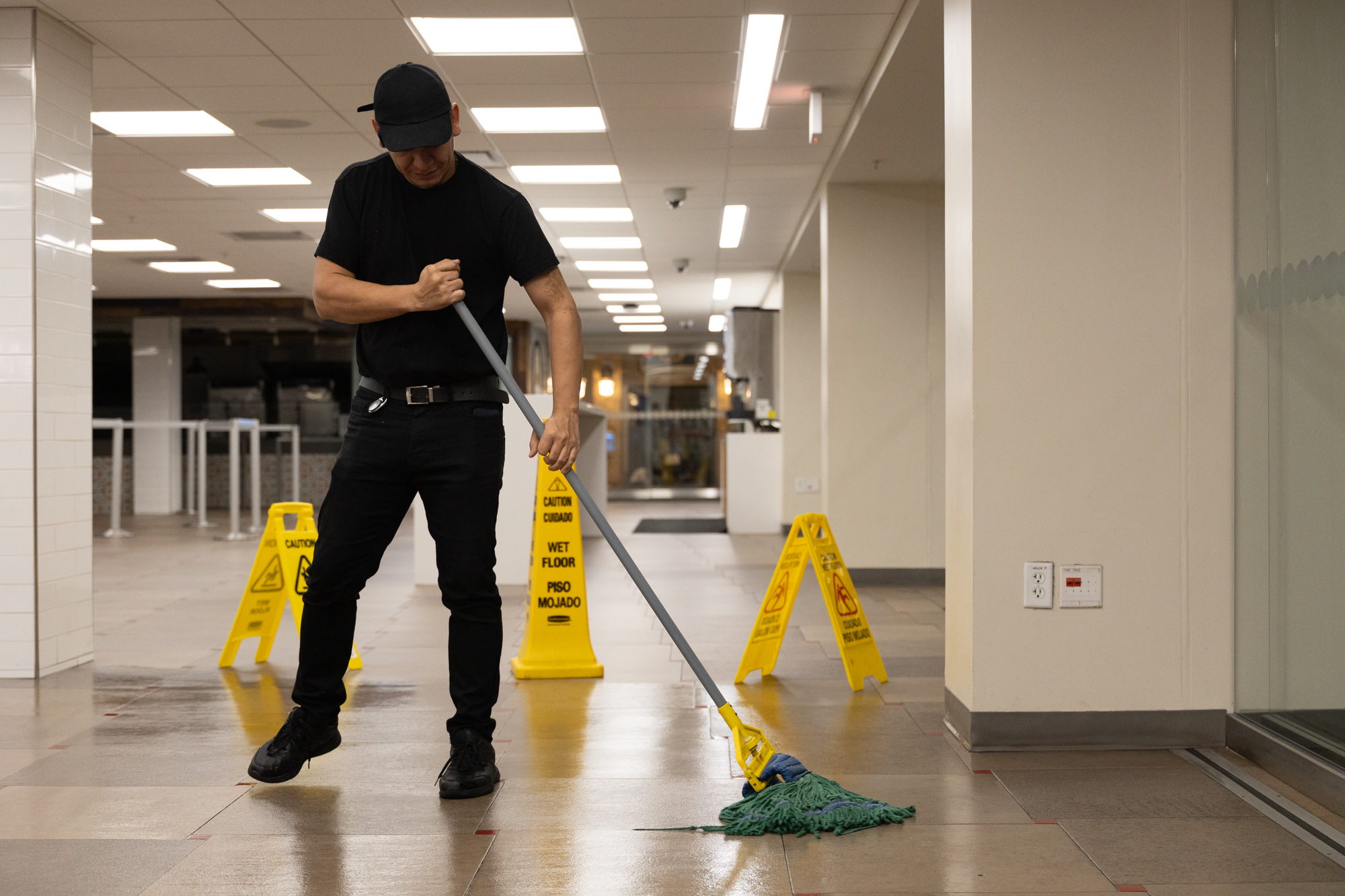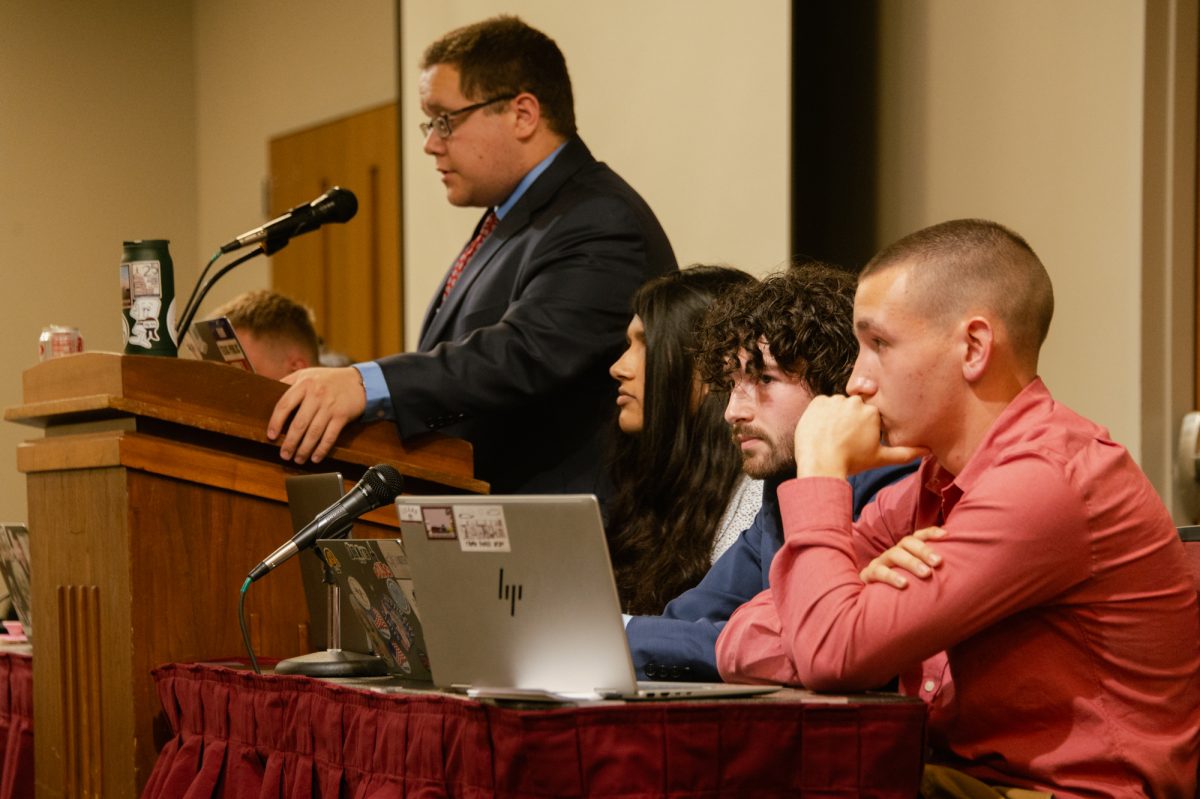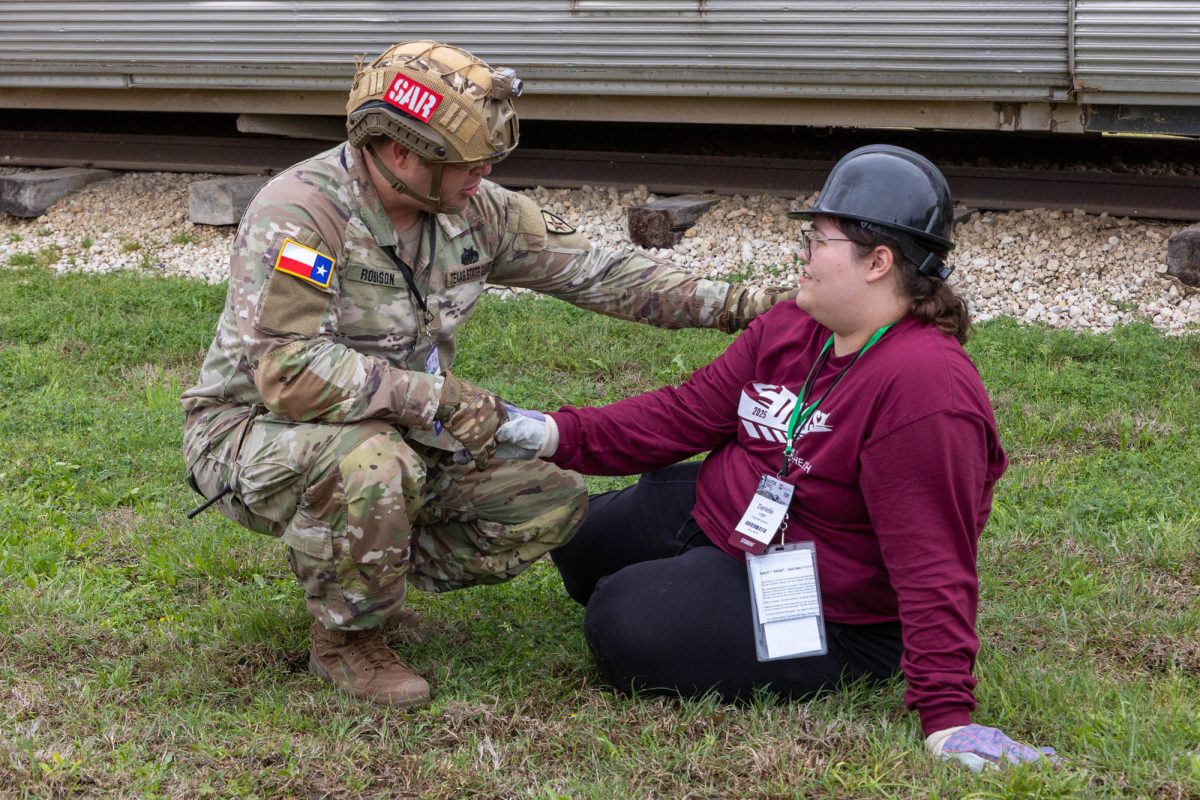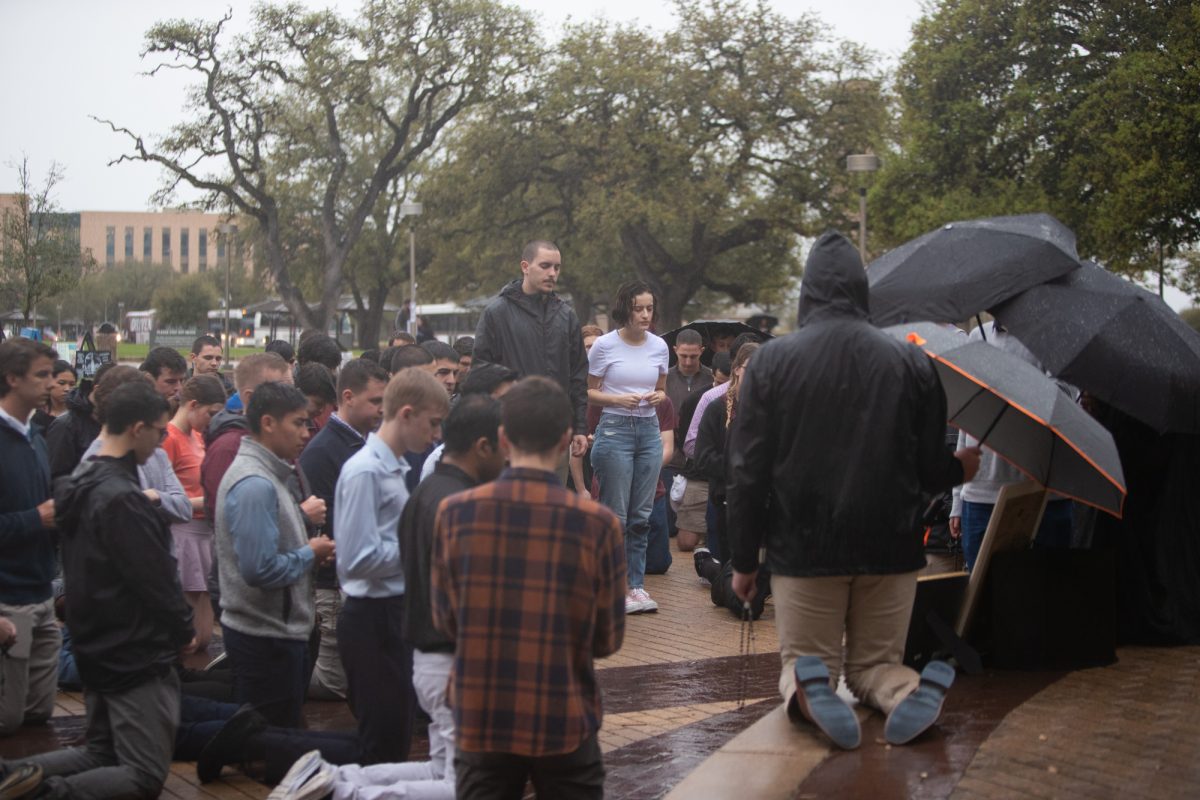In the aftermath of the 2008 financial crisis, John Sharp, the newly appointed chancellor of the Texas A&M System, authorized a third-party company to run food service, ground maintenance and janitorial services in College Station.
But the cost-saving measure has seen workplaces across campus change into a “toxic” culture where sexual abuse and labor law violations allegedly run rampant, according to current and former employees working under Compass Group North America and its two subsidiaries, SSC and Chartwells.
“It was three years of the most toxic environment I had ever worked in,” an upper-level managerial employee for Chartwells said. “There was zero accountability in terms of staff violating rules. My first semester up there, I had conducted 13 investigations into staff members at The Commons dining hall.”
The employee asked to remain anonymous out of fear of retaliation, having recalled several instances of her supervisors refusing to discipline high-ranking employees after instances of sexual assault.
SSC was charged with overseeing campus custodial services, and Chartwells runs every dining location on campus.
As a former student, she was excited to return to A&M to work with Chartwells in human resources. But settling into the role, she began to notice discrepancies in how employees were treated.
“What I saw was the worst workplace harassment and bullying I had ever seen in my career,” the managerial employee said. “Typically in those processes, as I start to investigate, I take a look at what notes, what documentation, prior write-ups, things like that, what do you have that can assist in the investigation. They had nothing.”

Roughly a dozen employees working at on-campus Chartwells locations told The Battalion they rarely reported harassment to HR because documentation was not kept and rules were seldom enforced. All current employees interviewed requested anonymity for a variety of reasons, including concerns that they could lose their benefits, direct instruction not to talk to the press or worries of general workplace retaliation.
The managerial employee recalls being asked by concerned employees to look into matters, often told she was the only employee willing to investigate.
“There was a culture in which what mattered most was bodies,” she said. ‘Just having bodies in these positions. Standards of behavior were overlooked. We had a director who had physically grabbed a female associate who worked at the Chick-fil-A down in Sbisa … I knew I would never be allowed to terminate a director. I told the young lady to call the police.”
When provided a list of questions about the allegations, Regan Lyrek, a communications manager at SSC responded with a statement that reads “SSC takes any issue that arises very seriously and fosters a positive work environment supported by regular training, policy reviews, and swift action on reported incidents.”
“Even in senior management, sexual harassment was a major problem,” the managerial employee said. “We had a very senior operations person who was written up and got a slap on the hand … for going up to a female manager who was making fresh-squeezed orange juice and said, ‘I always knew you were a squirter.’ … We had a senior-level executive chef accused of sexually assaulting a female manager. All of these things were swept under a rug.”
A common experience among employees interviewed was the lack of staff working critical areas around campus, such as dorm cleaning and dining halls. When interviewing new applicants, the managerial employee said the wages Chartwells offered were so low it posed an ethical issue for her.
“Chartwells addressed it by shoving money up against it to hide it,” the managerial employee said. “The account at A&M makes a tremendous amount of money. I believe it’s 72 million dollars. So everything was colored by that.”
The difference in the experience of working under Compass and A&M was night and day. Molly Henderson, a former janitor and food service employee, said her days working under SSC were some of her worst.
“My first day, they told everybody in our crew that we no longer worked for A&M University, we had been outsourced to a contractor, which is SSC,” Henderson said. “There were middle-aged women there crying, older people that were getting ready to retire that would be losing their pensions, their retirement, their everything.”
To the employees, A&M abandoned them after decades of employment. The shift to SSC was unexpected, and the changes, Henderson said, forced some employees into poverty and homelessness.
After the transition was finalized in 2011, multiple employees’ salaries were lowered, and the benefits that were originally available — which was similar to what professors were offered — were degraded, according to documents reviewed and verified by The Battalion.
“Many people don’t even have [health insurance] …,” Henderson said. “It’s expensive. The deductibles are high. A lot of people, it’s not even in their budget to even have this insurance … A lot of people had two jobs or a spouse with a job. Frequently, they would go to the 12th Can for food.”
Now working as a building access technician for A&M, Henderson retires next month. But her concern for her fellow employees lives on, especially for those unable to regain employment at the university.
An assistant janitorial supervisor who asked to remain anonymous due to ongoing litigation said her and other custodians would get written up for receiving food or gifts from students. In one incident, she alleged being penalized for talking to a professor about SSC employees going on break.
Employees from food service to maintenance confirmed they were not allowed to discuss their wages with each other. The assistant janitorial supervisor alleges workplace harassment when trying to do so, potentially violating federal labor laws.
“They tell us all the time, ‘Do not discuss wages. Do not do that,’” a current janitor with a decade of experience at SCC said. She requested anonymity due to fears of workplace backlash. “The bosses are telling us the supervisors … they’ll call you in the office and sit you down, saying, ‘This is why we don’t tell people this, because they get mad.’”
She still makes under $15 an hour after a decade of experience. For her 10-year evaluation, she received a 40 cent raise. The pay — matched with what the company asks from employees, such as poor working conditions and overworking — has led to mental strain among employees, according to those interviewed by The Battalion.
Often, the long hours spent working was not enough for supervisors.
“We were scraping floors with a razor blade from seven to seven [during summertime],” the assistant janitorial supervisor said. “And every time they would come in, it was never good enough. It was never good enough. It was taking a mental toll on a lot of the workers because the job was never good enough.”
Working under Chartwells has the same alleged issues as SSC, according to a current food service employee who requested anonymity due to an all-staff meeting that threatened to penalize employees that discussed working conditions with the media.
“One of our cooks that had been with us forever, she left the job a few weeks ago,” the food service employee said. “She had been there five, six years, and she was like, ‘ … I can’t just handle it anymore.’ We just don’t have help.”
The difficulties involved with getting a raise have made her consider leaving her role, a thought suppressed by her love for the students — a sentiment shared by others interviewed. She began at $7.25 an hour. After eight years, she makes $11.20.
“When I was a custodian, whether it be at Res Life or at the Memorial Student Center, the students were the best part about my job,” Henderson said. “They learn your name. They talk to you. They tell you what’s going on in their life. It’s like I had 60,000 kids.”
Henderson said other universities around the U.S. have seen success bringing staff back under the college, an idea A&M could replicate. But no action has been taken.
“I would just so love for all the kids who were put up for adoption can come home,” Henderson said. “The custodians, the food service workers, the landscape maintenance people, maintenance people too. All of them.”
Editor’s note: A segment of this story was removed post-publication.






















Jade • Dec 10, 2024 at 8:21 pm
This Article is so true. It’s so much I can say, but I’m glad I left…
Jade • Dec 10, 2024 at 8:14 pm
Well, well, I guess I wasn’t the only one felt this way. Leaving was the best thing I’ve done. I couldn’t see myself working hard for a little pay, it wasn’t cutting the bills. The pay is made for kids in school not for ppl that actually have BILLS. Upper management there is focus on getting bonuses why the custodians were struggling to get by with the pay. They ought to be shame how they treated ppl in raises, Heartless. You can make more working at fastfood than being a Custodian there. Only you can make that change. It’s so much I can tell but y’all already know and said ENOUGH in the news feed
Concerned SSC Worker • Dec 9, 2024 at 5:37 am
Jessica,
A&M might have outsourced but they chose SSC because of the things they agreed to do. This article is about them failing…miserably, NOT A&M. Texas A&M did assure temporary longevity, and transitioned workers got an extra amount of off days, sick time and vacation. SSC Offered you $9 not TAMU.
Jessica Ramirez • Dec 2, 2024 at 7:23 pm
I worked for A&M 14 almost 15 years and when we got outsourced it broke me it’s true we felt like we were no longer part of the a&m family I couldn’t deal with that ! Then when I thought of going back they wanted me to start at $9 an hour after all the years I gave them before no thank you ! Then I wouldn’t have gotten my benefits I had with a&m ! All this has been so hard on all of us that worked with a&m and the change was really causing a lot of us to have horrible depression ! They did that !